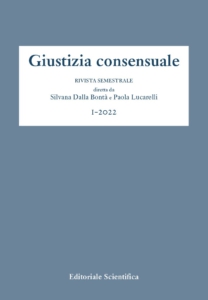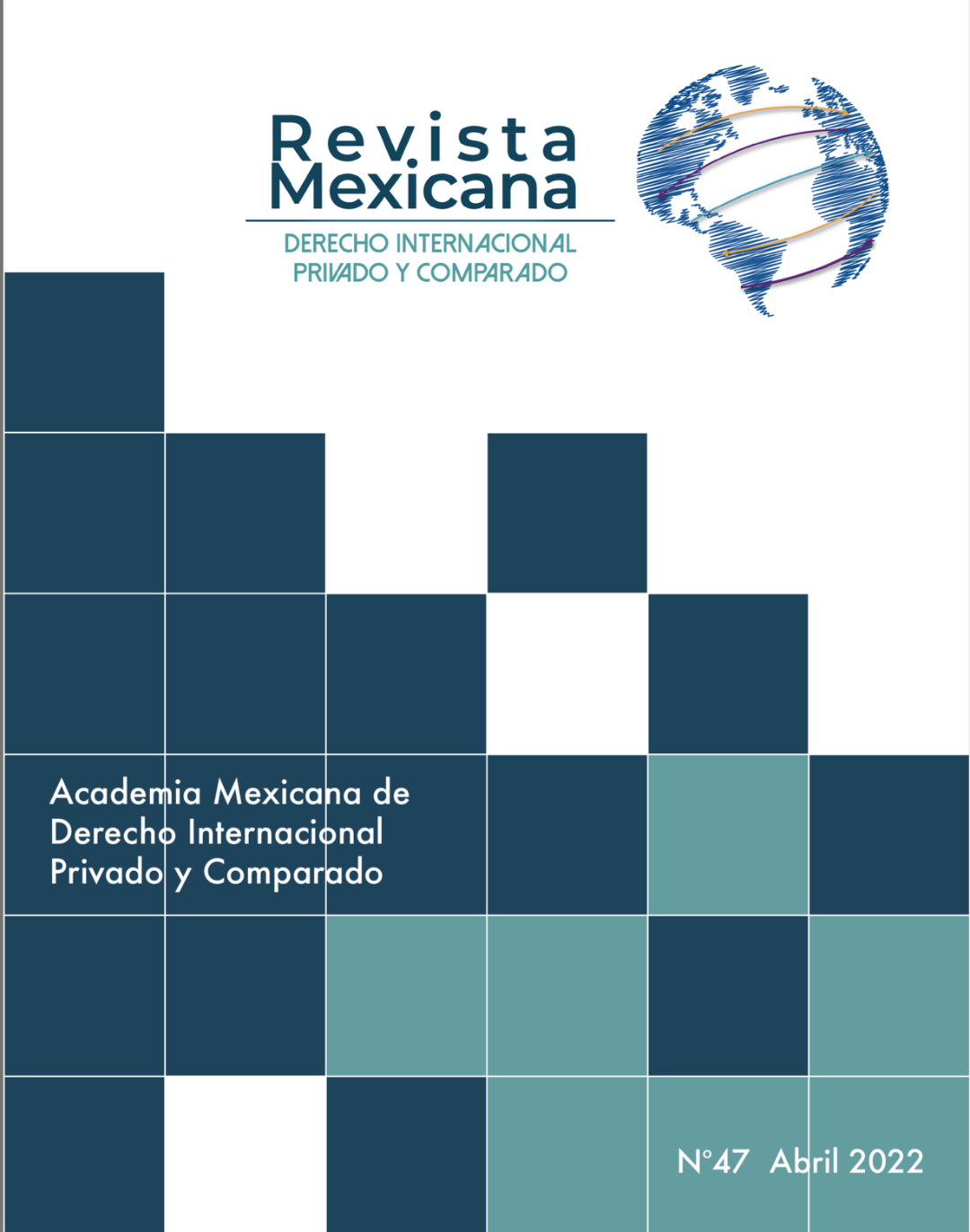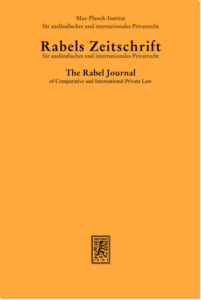 The first issue of 2022 of Giustizia Consensuale (published by Editoriale Scientifica) has just been released, and it features:
The first issue of 2022 of Giustizia Consensuale (published by Editoriale Scientifica) has just been released, and it features:
Andrea Simoncini (Professor at the University of Florence) and Elia Cremona (PhD, University of Siena), Mediazione e Costituzione (Mediation and Constitution; in Italian)
This paper deals with the issue of the constitutional basis of mediation. After describing the currently dominant view which sees mediation as merely a ‘means’ to an end, such as reducing the judicial backlog, and as a complementary tool to in-court proceedings, the authors argue that mediation could be considered as a constitutional ‘end’ in itself. Thus, by promoting the attainment of a more cohesive society, mediation is seen as a way to fulfil the social solidarity obligations as enshrined in the Italian Constitution.
Claudio Cecchella (Professor at the University of Pisa), La negoziazione assistita nelle controversie sulla crisi delle relazioni familiari dopo la riforma con legge n. 206 del 2021 (Lawyer-Assisted Negotiation Procedure in Family Disputes Subsequent to Law No 206 of 2021; in Italian)
This paper analyses the provisions of Law No 206 of 2021 concerning the negotiation process assisted by attorneys in family disputes. The author firstly examines the provisions which entered into force on 22 June 2022, such as the extension of the scope of application of this negotiation process. Secondly, he explores the provisions that will enter into force at a later date, such as the possibility of agreeing to a lump-sum maintenance payment, the provision of legal aid and the right to take evidence during negotiations. While praising this reform, the author strongly criticizes it for not having provided for the minor’s right to be represented and heard during the negotiation process.
Juan F. Herrero (Professor at the University of Zaragoza), Accordarsi o soccombere (Reaching an Agreement or Losing the Case; in Italian)
Settlement rates are still relatively low compared to the percentage of cases that go to trial. Against this backdrop, the Spanish legislator has committed to reversing the trend. After some early efforts that were in vain, the legislator resorted to two instruments: the mandatory mediation attempt as a prerequisite to instituting judicial proceedings (as an alternative to mediation, parties may opt for other extrajudicial dispute resolution methods), and a new scheme for the allocation of judicial costs. The paper investigates correlations between judicial decisions on cost allocation and mandatory or voluntary extrajudicial settlement attempts. Furthermore, it examines the impact of the aforementioned attempts on the determination of judicial costs, with a special focus on relevant case law. Oftentimes, the risk or likelihood of obtaining an unfavourable – or only partially favourable – decision on the allocation of costs prompts the parties to reach an out-of-court settlement. In fact, if it is not the case, the winning party to litigation stands to lose more than they would gain financially.
Stefania Brun (Professor at the University of Trento), ‘Proceduralizzazione’ dei poteri datoriali e mediazione sindacale. Il laboratorio trentennale in materia di licenziamenti collettivi (Trade Union Mediation in Collective Dismissal. A Study of its Application over Three Decades; in Italian)
This article reviews the three-decade history and present-day application of Law No 223 of 1991 on collective dismissal. While providing an overall positive evaluation of this law, the article seeks to examine the role of the judicial and legislative branches in promoting best practices in its application. In this regard, it emphasizes the role of trade union mediation in the phase preceding collective dismissal as an effective means for reducing judicial scrutiny and ensuring greater legal certainty.
Antonio Cassatella (Professor at the University of Trento), Il procedimento amministrativo come strumento di giustizia consensuale. Potenzialità e limiti (Administrative Procedure as a Means to Reach Consensual Justice. Strengths and Limitations; in Italian)
This paper focuses on settlements reached by an individual and the public administration in the course of an administrative procedure as governed by Law No 241 of 1990. According to the author, these types of settlement are only possible if the administrative procedure is not seen as a unilateral exercise of the public administration’s power, but rather as a way of settling disputes between the administration and citizens. The author argues that the administrative procedure can be considered an alternative dispute resolution mechanism from a theoretical point of view. However, Article 11 of the aforementioned law cannot be considered an effective legal basis for settlement between an individual and the public administration due to its intrinsic limitations. Therefore, the author proposes that the Italian legislator reforms Law No 241 of 1990 taking the German and French legislations as a model.
Observatory on Legislation and Regulations
Lorenzo Bianchi (PhD, University of Parma), La conciliazione giudiziale tributaria. Criticità applicative e prospettive di riforma (Judicial Conciliation in Tax Disputes. Inherent Limits and Reform Proposals; in Italian)
This paper analyzes the mechanism of judicial conciliation in tax disputes and its relationship with out-of-court dispute resolution tools. The author examines the historical evolution of judicial conciliation and its current regulation. While exploring the main characteristics of tax disputes, particular attention is given to the inherent limits on reaching an agreement between the parties to litigation and the judicial power to promote settlement. In conclusion, the analysis focuses on the recent Italian reform proposals of the judicial proceedings regarding tax disputes and conciliation mechanisms as incentivized by the Next Generation EU plan.
Observatory on Practices
Dilyara Nigmatullina (Postdoctoral Researcher at the University of Antwerp) and Ruohan Zhu (Project manager at the Shanghai Arbitration Commission), A Study on the Use of Mediation in Combination with Arbitration. The Experience of East Asia with Focus on Mainland China
The article analyses the results of an empirical study about the current use of mediation in combination with arbitration (combinations) in international commercial dispute resolution. This study follows up the original study conducted by one of the article’s authors in 2014-2015, the results of which suggested the existence of a link between the practitioners’ legal culture and their use of a combination where the same neutral acts as a mediator and an arbitrator. The follow-up study further tests the hypothesis about the existence of the mentioned link by involving practitioners based in the East Asia region, predominantly in mainland China, while those taking part in the original questionnaire practiced in Continental Europe and common law jurisdictions in the Asia Pacific region. The article discusses the results of the follow-up study in the context of the findings of the original study before concluding that these results provide further support to the hypothesis that the use of a combination where the same neutral acts as a mediator and an arbitrator varies throughout the world and can be linked to the practitioners’ legal culture.
Francesca Valastro (Case Manger, Milan Chamber of Arbitration), La mediazione in videoconferenza. Dalla situazione emergenziale agli orizzonti futuri. Dati e note a margine di un’indagine empirica (Online Mediation: From Necessity to the Norm. An Empirical Study; in Italian)
The outbreak of the Covid-19 pandemic in March 2020 affected the way mediations in civil and commercial matters were conducted, transforming online mediation into an absolute necessity. Two years on, the world has changed and in this post-Covid time, it would be advisable to assess how the pandemic has affected the practice of mediation. Will mediation return to be conducted face to face or will online mediation be the future? This article presents the results of the empirical research collected through interviews with fifty attorneys assisting clients in mediation and fifty professional mediators of the Mediation Service at Milan Chamber of Arbitration. Based on the analysis of their responses, the author argues that online mediation will have a pivotal role in the post pandemic world. However, further research and analysis is still necessary to develop best practices and guidelines for effectively managing mediation remotely.
In addition to the foregoing, this issue features the following book review by Giuseppe Buffone (Judge, Justice and Home Affairs Counsellor, Permanent Representation of Italy to the European Union, Brussels): Maria MARTELLO, Una giustizia alta e altra. La mediazione nella nostra vita e nei tribunali (Mediation in Our Courts and in Our Daily Lives. An Empowering Alternative), Roma, Paoline Editoriale Libri, 2022, 1-160.


 The first issue of 2022 of
The first issue of 2022 of 
 The latest issue of RabelsZ has just been released. It contains the following contributions:
The latest issue of RabelsZ has just been released. It contains the following contributions: